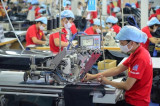Vietnam attracts over 39,100 FDI projects with registered capital of nearly 469 billion USD so far
Vietnam had attracted 39,140 foreign direct investment (FDI) projects with total registered capital of over 468.91 billion USD by the end of 2023, reported the Foreign Investment Agency under the Ministry of Planning and Investment (MPI).
.jpg) Illustrative photo
Illustrative photo
Ho Chi Minh City topped the list of localities nationwide in FDI attraction with 12,398 projects and registered capital of 57.63 billion USD, accounting for 31.67% of the total number of projects and nearly 13% of the total registered capital. It was followed by Hanoi with 7,363 projects and registered capital of 41.17 billion USD; and southern Binh Duong province with 4,217 projects and 40.4 billion USD.
Other major investment destinations in Vietnam included Dong Nai, Ba Ria-Vung Tau, Hai Phong, Bac Ninh, Thanh Hoa, Long An and Quang Ninh.
Meanwhile, 10 localities with the lowest amounts of FDI in Vietnam included Lai Chau, Dien Bien, Ha Giang, Cao Bang, Bac Kan, Gia Lai, Son La, Ca Mau, Tuyen Quang and Dong Thap.
In 2023 alone, Vietnam attracted 36.6 billion USD in FDI with major investment destinations including Ho Chi Minh City, Hai Phong, Quang Ninh, Bac Giang, Hanoi, Bac Ninh, Binh Duong, and Dong Nai.
According to the MPI, in the past time, the FDI capital flows into Vietnam have still focused on provinces and cities that have many advantages such as favourable infrastructure and stable human resources, administrative reform and dynamism in investment promotion.
Deputy Minister of Planning and Investment Tran Quoc Phuong said at a recent meeting that the position and role of Vietnam in the global FDI flows have continued to improve
Vietnam has not only been an attractive investment destination, with registered FDI capital in 2023 reaching about 36.6 billion USD, a year-over-year increase of over 32%, but also proactively invested abroad, even in developed economies and in new industries.
Moreover, Vietnam has strongly promoted innovation, digital economy, green growth, circular economy, and new economic sectors such as chip manufacturing, semiconductors, high-tech agriculture, and mining, high-quality human resources training to better seize opportunities from major countries’ strategic competition, global FDI capital flow shifting, free trade agreements, and partnerships with other countries.
However, Phuong said that Vietnam’s foreign investment in the new situation still faces shortcomings in terms of institutions, policies, investment quality and efficiency.
He added that Vietnam is a bright spot in FDI attraction in the world but the link between the FDI sector and domestic enterprises is still weak and has not strongly promoted technology transfer and improved position in the global value chains./.
VNA
 Criteria of 2024 projected to early accomplishment
Criteria of 2024 projected to early accomplishment
 Import-export turnover reaches nearly US$53 billion
Import-export turnover reaches nearly US$53 billion
 Binh Duong vibrant with e-commerce week and super promotional month
Binh Duong vibrant with e-commerce week and super promotional month
 Training workshop on restructuring of industry and trade successfully organized
Training workshop on restructuring of industry and trade successfully organized
 Bank encourages checking transactions on applications
Bank encourages checking transactions on applications
 Ben Cat concentrates efforts to fulfill socio-economic development targets
Ben Cat concentrates efforts to fulfill socio-economic development targets
 Forstering a logistics center with regional connection
Forstering a logistics center with regional connection
 To clear bottlenecks, make good use of FTAs
To clear bottlenecks, make good use of FTAs
 Vietnam balances supply and demand to prepare for Tet shopping season
Vietnam balances supply and demand to prepare for Tet shopping season
 Developing Bac Tan Uyen district into a town in the period 2030-2040
Developing Bac Tan Uyen district into a town in the period 2030-2040







